Ringover Alternatives
Explore 10 alternatives to Ringover. This guide analyzes each on features, pricing, and performance to inform your business decision.

You might be using Ringover for good reasons. It’s a solid tool for its core calling features and has a simple design. When you just need a reliable phone dialer for your team's daily calls, it works well.
But it has some limitations. Some users mention occasional call quality drops or slow customer support. These hiccups can lead you to look for an alternative. We've analyzed the top options to help you compare them. Let's get started.
For Digital Sales Workers, Consider 11x
If your sales process could benefit from digital workers, 11x is a relevant option. It provides autonomous agents to handle parts of your sales workflow. You can explore how this approach might fit your team's needs.
We built 11x as a GTM platform that uses AI agents to manage sales. An agent named Alice finds prospects, handles outreach on email and LinkedIn, and keeps the CRM current. Another agent, Julian, qualifies inbound leads and books meetings for your team.
The platform consolidates tools for data enrichment, outreach, and email warmup. This can replace multiple point solutions in a typical GTM stack.
Ringover Alternatives
The following section provides a detailed analysis of Ringover alternatives. We examine each tool's pricing, features, and its specific pros and cons in relation to Ringover to help guide your decision.
1) Aircall
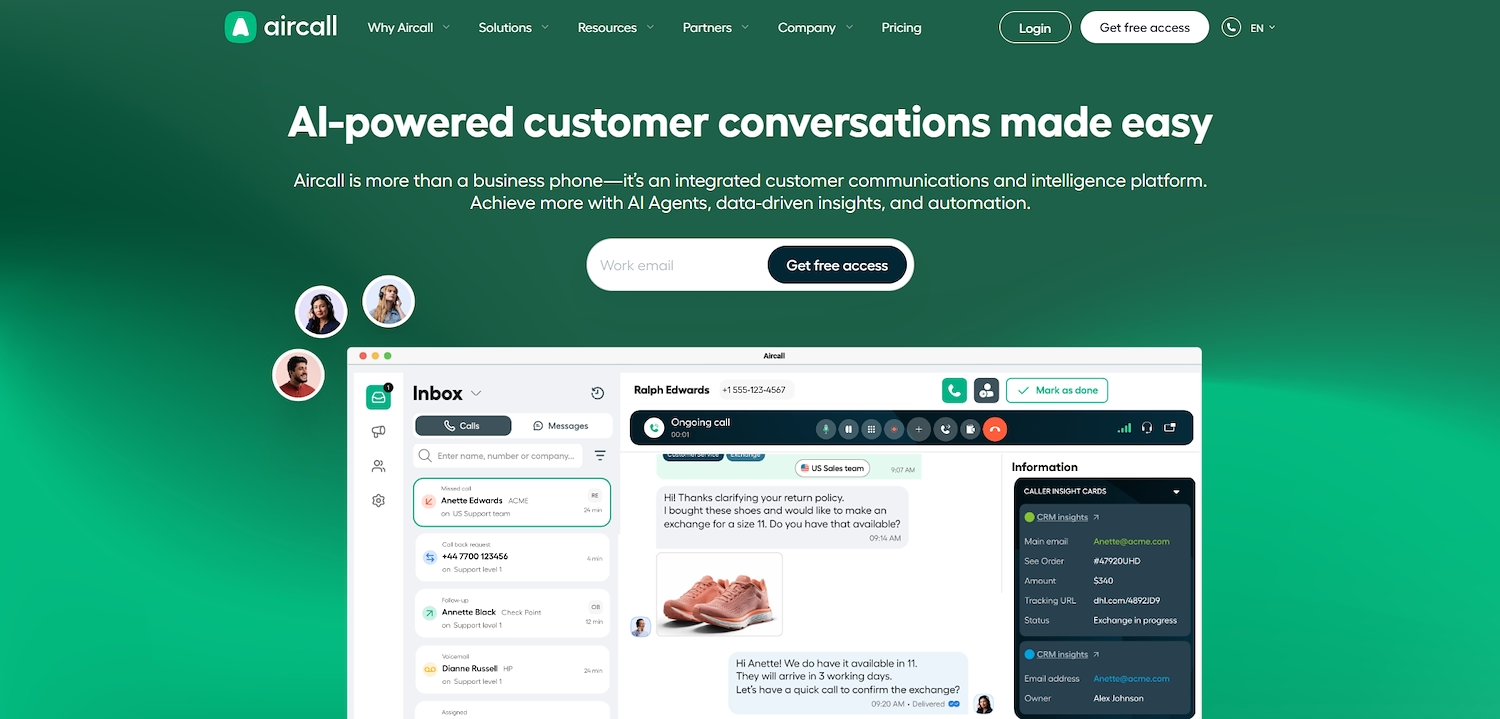
Aircall operates as a cloud communications platform for sales and support. It puts voice, SMS, and WhatsApp into a single workspace. The service includes a Power Dialer for outbound sales and an IVR to direct inbound calls.
AI agents can handle calls automatically, 24/7. The platform integrates with over 100 tools and allows for a quick, hardware-free setup, a good fit for remote teams.
Aircall's Main Features
- Handles, qualifies, and routes inbound calls autonomously with 24/7 virtual agents.
- Delivers real-time coaching during live calls and automates follow-up workflows with AI Assist.
- Manages WhatsApp conversations, calls, and texts within a single, unified workspace.
- Provides powerful analytics to track KPIs, surface trending topics, and identify calls that need review.
How Aircall Compares To Ringover
Average Review Score: 4.4/5 stars based on 1,314 G2 reviews.
- Aircall connects with over 100 business apps. This provides more integration options for your tools than Ringover offers.
- Its AI agents can handle and route inbound calls automatically, 24/7. This is different from Ringover, where call management is manual.
- The tool puts voice calls, SMS, and WhatsApp messages into one shared inbox. This creates a more unified communication space compared to Ringover's focus on voice calls.
- For sales teams, Aircall has a Power Dialer and live call coaching. These features provide specific support for sales workflows that you can compare to Ringover's toolset.
Where Aircall May Fall Short
Aircall requires a three-user minimum for its plans. This structure might be less suitable for very small teams that do not meet this requirement, unlike some other platforms.
Some users mention the application can be slow to load. Its mobile app also sometimes lags, which can be a point of difference from Ringover's straightforward performance.
The tool has limits on included SMS messages per month before extra charges apply. This is a detail to consider when you compare its value against Ringover's offerings.
A weak internet connection sometimes affects Aircall's call quality. This is a factor to weigh against Ringover, which is primarily known as a reliable phone dialer.
Budget and Pricing Considerations
Aircall's Essentials plan is $30 per user per month, and its Professional plan is $50 per user per month, both requiring a three-user minimum. This pricing structure sets a baseline monthly cost of $90, a key point to weigh against Ringover's packages.
2) Dialpad Ai Voice
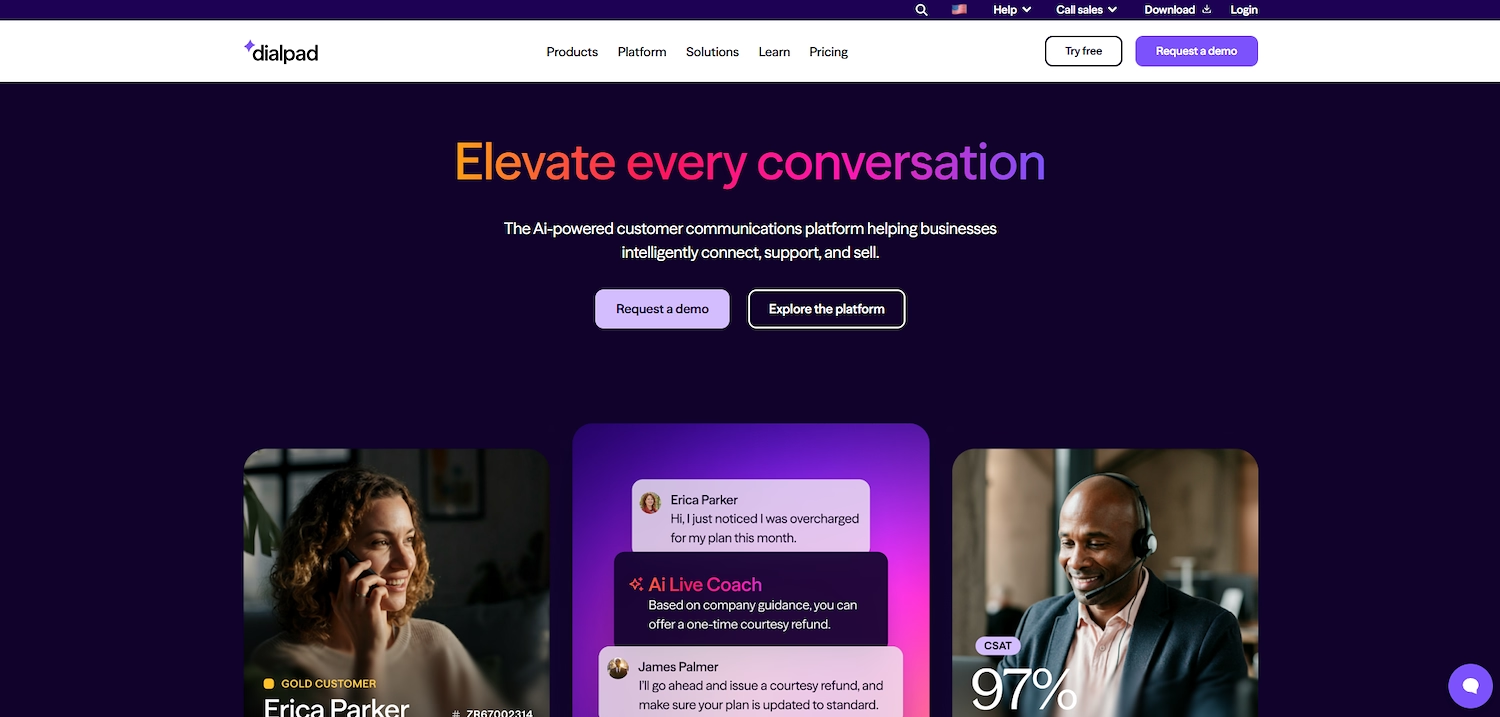
Dialpad Ai Voice is a cloud platform for customer communications. It combines calls, messages, video, and contact center functions into one application. Its AI generates real-time transcriptions, summaries, and action items. Companies use it to unify phone providers and manage sales or support teams.
Dialpad Ai Voice's Main Features
- Combines calling, messaging, and video meetings into one cloud application.
- Delivers real-time transcriptions, summaries, and coaching tips using a proprietary large-language model.
- Offers an outbound sales dialer with real-time AI coaching and workflow automations.
- Provides a contact center module with AI agents, live coaching, and deep analytics.
How Dialpad Ai Voice Compares To Ringover
Average Review Score: 4.4/5 stars based on 3,901 G2 reviews.
- Dialpad Ai Voice combines calls, messages, and video meetings into one application. This is different from Ringover, which focuses mainly on voice call features.
- It uses AI to create real-time transcriptions and summaries from calls. This provides more automation compared to the manual call management in Ringover.
- The platform allows users to switch between devices during a live conversation, offering a point of comparison to Ringover's device flexibility.
- This tool integrates with Google Workspace and Microsoft 365. This expands its use within common business software, a factor to weigh against Ringover's app connections.
Where Dialpad Ai Voice May Fall Short
Some users report occasional connection glitches that affect call quality. This is a point of difference from Ringover, which focuses on reliable phone service.
Its wide range of features can create a learning curve for administrators. In comparison, Ringover offers a more straightforward design that teams may adopt faster.
The platform may add charges for SMS messages over a monthly limit. This is a cost detail to weigh against Ringover's plan structure.
Budget and Pricing Considerations
Dialpad Ai Voice's Standard plan is $15 per user per month when billed annually, and its Pro plan is $25. This pricing can offer a more accessible starting point, though a direct cost comparison depends on Ringover's specific package. For the most accurate pricing, visit Dialpad Ai Voice's official website.
3) RingCentral MVP
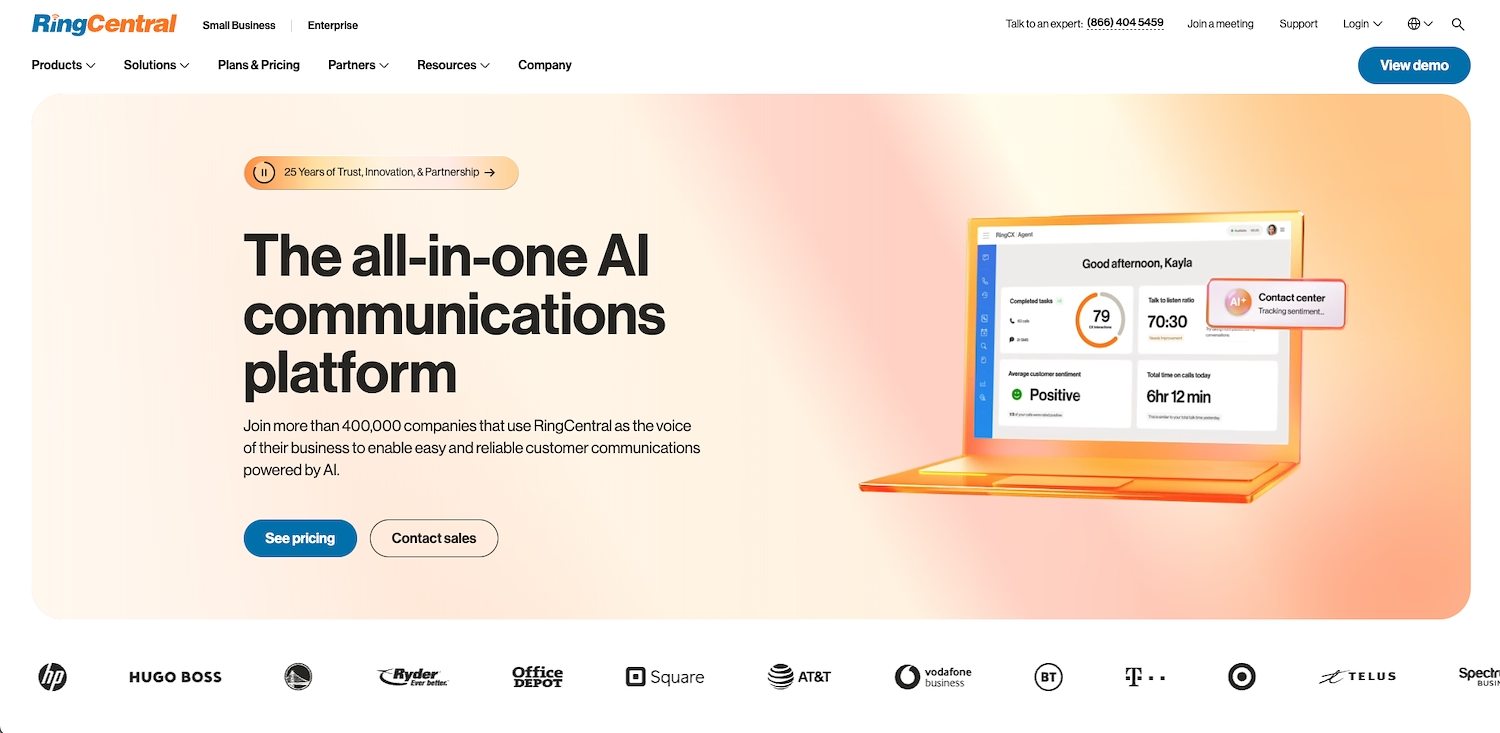
RingCentral MVP is a business communication platform. Its name reflects its core functions: messaging, video, and phone (MVP). The service combines these capabilities into a single application. This allows teams to manage different communication types from one place, offering an alternative to using separate tools for each.
RingCentral MVP's Main Features
- Combines messaging, video, and phone services into one application.
- Allows teams to manage all communication from a single workspace.
- Replaces the need for separate tools for messaging, video, and phone calls.
How RingCentral MVP Compares To Ringover
Average Review Score: 4.0/5 stars based on 154 G2 reviews.
- RingCentral MVP integrates over 30 digital channels, including social media and email, for customer contact. This provides more communication options than Ringover's primary focus on phone calls.
- It offers over 300 prebuilt integrations with other business tools. This allows for more extensive connections to your existing software stack than Ringover provides.
- The platform includes AI options like virtual agents and bots for self-service. This automates some customer interactions, which are handled manually in Ringover.
- This tool provides an AI-powered solution for workforce analytics and management. This offers deeper insights into team performance compared to the reporting features in Ringover.
Where RingCentral MVP May Fall Short
- Some users report occasional call quality issues. This is a point of comparison with Ringover, which is known for its reliable core calling functions.
- The platform's extensive features can create a learning curve. Teams that need a simple phone dialer may find Ringover's focused design easier to adopt.
- Its setup can be more involved. The implementation time is around two months, which differs from the quicker start possible with Ringover's simpler structure.
Budget and Pricing Considerations
RingCentral MVP does not list public pricing, but its perceived high cost suggests a model aimed at larger enterprises, differing from the per-user plans of other tools. For exact figures, it is best to visit RingCentral MVP's official website.
4) Nextiva
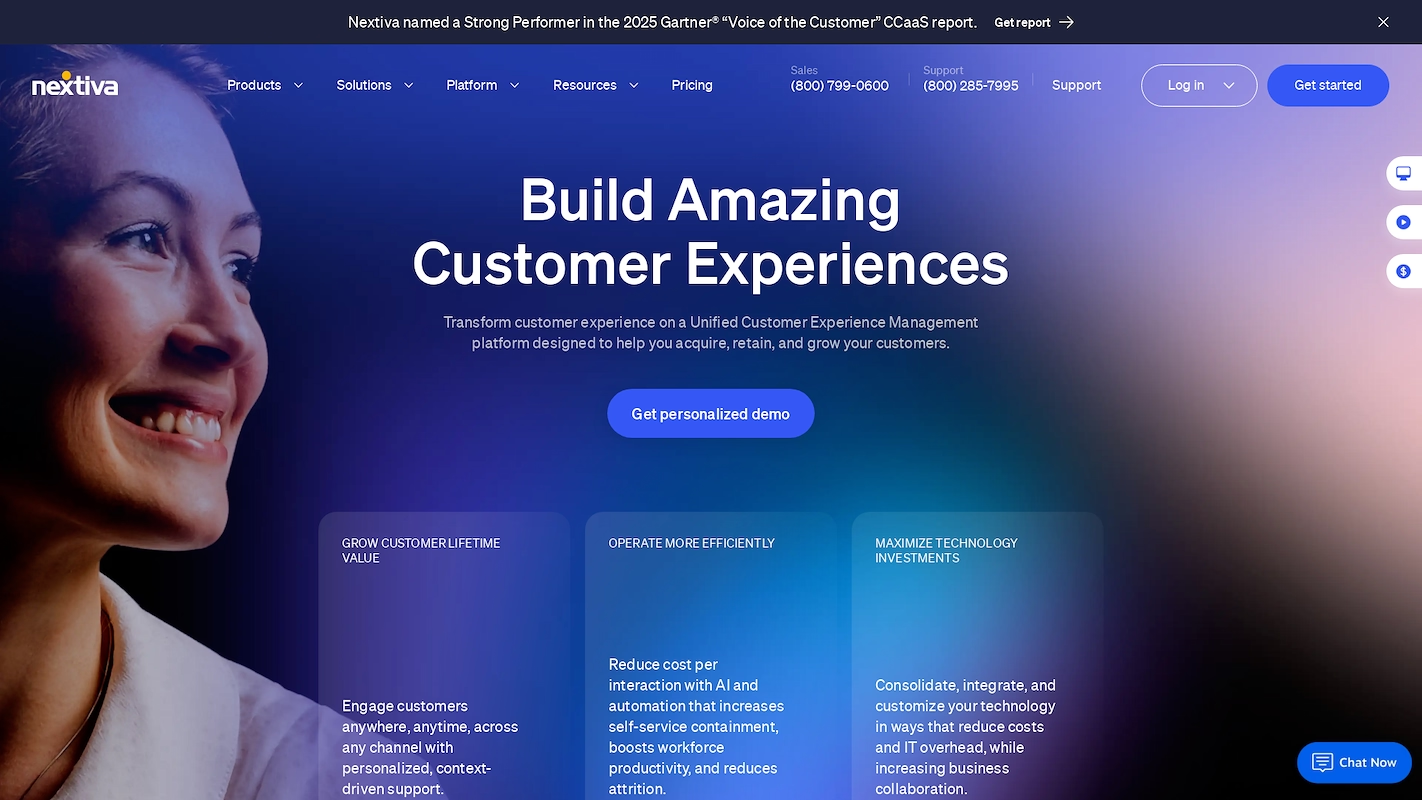
Nextiva provides a unified communications platform. It combines phone, video, and messaging into a single application for businesses. Teams use the service for sales calls and customer support. The system offers a business phone service with call management features, which consolidates tools for customer interaction.
Nextiva's Main Features
- Consolidates customer touchpoints like voice, chat, SMS, email, and social media into a single workspace.
- Orchestrates end-to-end customer journeys using a patented workflow engine with built-in AI and automation.
- Provides a generative-AI knowledge base, sentiment analysis, and language detection with translation.
- Includes a secure payment agent assist for collecting payment information during live interactions.
How Nextiva Compares To Ringover
Average Review Score: 4.5/5 stars based on 3,333 G2 reviews.
- Nextiva consolidates voice, chat, SMS, and email into a single workspace. This creates a more unified communication hub compared to Ringover's primary focus on voice calls.
- It uses a workflow engine with built-in AI to manage customer journeys. This provides a different level of automation than the manual call management in Ringover.
- The platform includes features like sentiment analysis and a generative-AI knowledge base. These tools offer deeper customer insights than Ringover's standard analytics.
- A secure payment agent assists with collecting payment details during live interactions. This is a specialized function that Ringover does not have.
Where Nextiva May Fall Short
- Some users mention occasional call issues with Nextiva. This contrasts with Ringover, which focuses on providing a reliable phone dialer for daily calls.
- The platform sometimes requires users to contact support for account changes. This is different from Ringover's simpler interface, which can offer more direct user control for basic adjustments.
- Its user interface can feel complex for some tasks, like navigating the fax portal. In comparison, Ringover provides a more simple design focused on core calling features.
Budget and Pricing Considerations
Nextiva's pricing starts at $20 per user per month for its Digital plan, a potentially accessible entry point. This per-user model allows for a direct cost comparison against Ringover's packages to see which offers better value. For detailed pricing, visit Nextiva's official website.
5) 8x8 X Series
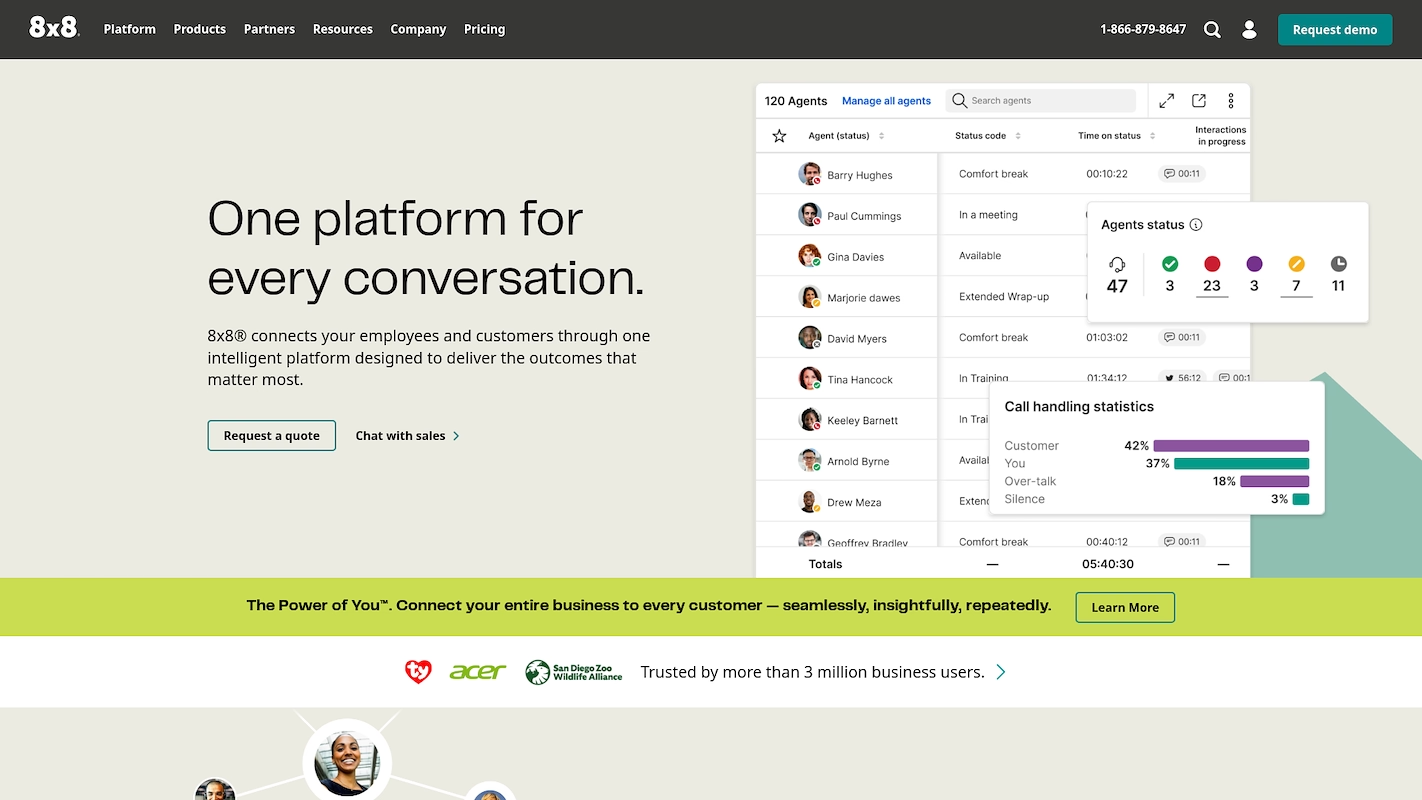
8x8 X Series is a cloud platform for business communications. It provides voice, video, and chat in a single application. Companies use it for their phone system and contact center operations. The X Series refers to its different service packages, designed for various business needs.
8x8 X Series's Main Features
- Provides global calling, video meetings, and team chat within a single application called 8x8 Work.
- Offers no-code and low-code APIs to embed voice, SMS, and chat channels into other applications.
- Adds enterprise telephony and contact center functions natively inside Microsoft Teams.
- Includes an omni-channel contact center that uses built-in AI to manage operations.
How 8x8 X Series Compares To Ringover
Average Review Score: 4.2/5 stars based on 765 G2 reviews.
- Unlike Ringover's focus on voice calls, 8x8 X Series combines voice, video, and chat into a single application.
- It supports video meetings with up to 500 participants, a capacity for large-scale video collaboration not available in Ringover's core phone service.
- The platform connects with over 40 business apps like Salesforce and Microsoft Teams, a more extensive list of integrations than Ringover provides.
- This tool offers global calling in over 55 countries with a 99.999% uptime guarantee, which gives it a wider international reach than Ringover.
Where 8x8 X Series May Fall Short
The platform's wide range of features can create a learning curve for new users. This is different from Ringover, which provides a more straightforward interface focused on core calling functions.
Some users report inconsistent experiences with customer support. This can be a point of comparison, as support for a more focused tool like Ringover may be more direct.
Its setup can be more involved, with an implementation time of around two months. Ringover's simpler structure often allows for a quicker start for teams that need a basic phone system.
Budget and Pricing Considerations
8x8 X Series does not list public pricing, but its perceived cost is high, suggesting a model aimed at larger companies. It offers mix-and-match plans for different needs. For exact figures, it is best to visit the 8x8 X Series's official website.
When to Choose 11x
If your go-to-market strategy could benefit from digital workers, 11x is a relevant option. Its AI agents handle prospecting, outreach, and CRM management. This lets your sales team focus on qualified meetings and closing deals. Consider this approach if you want to automate parts of your sales workflow.
With 11x, we use AI to run your sales playbook. Alice finds prospects and handles outreach, while Julian qualifies leads and books meetings. Our platform consolidates data, outreach, and warmup tools, replacing multiple solutions in a typical GTM stack.
Book a demo to see it in action.
6) CloudTalk
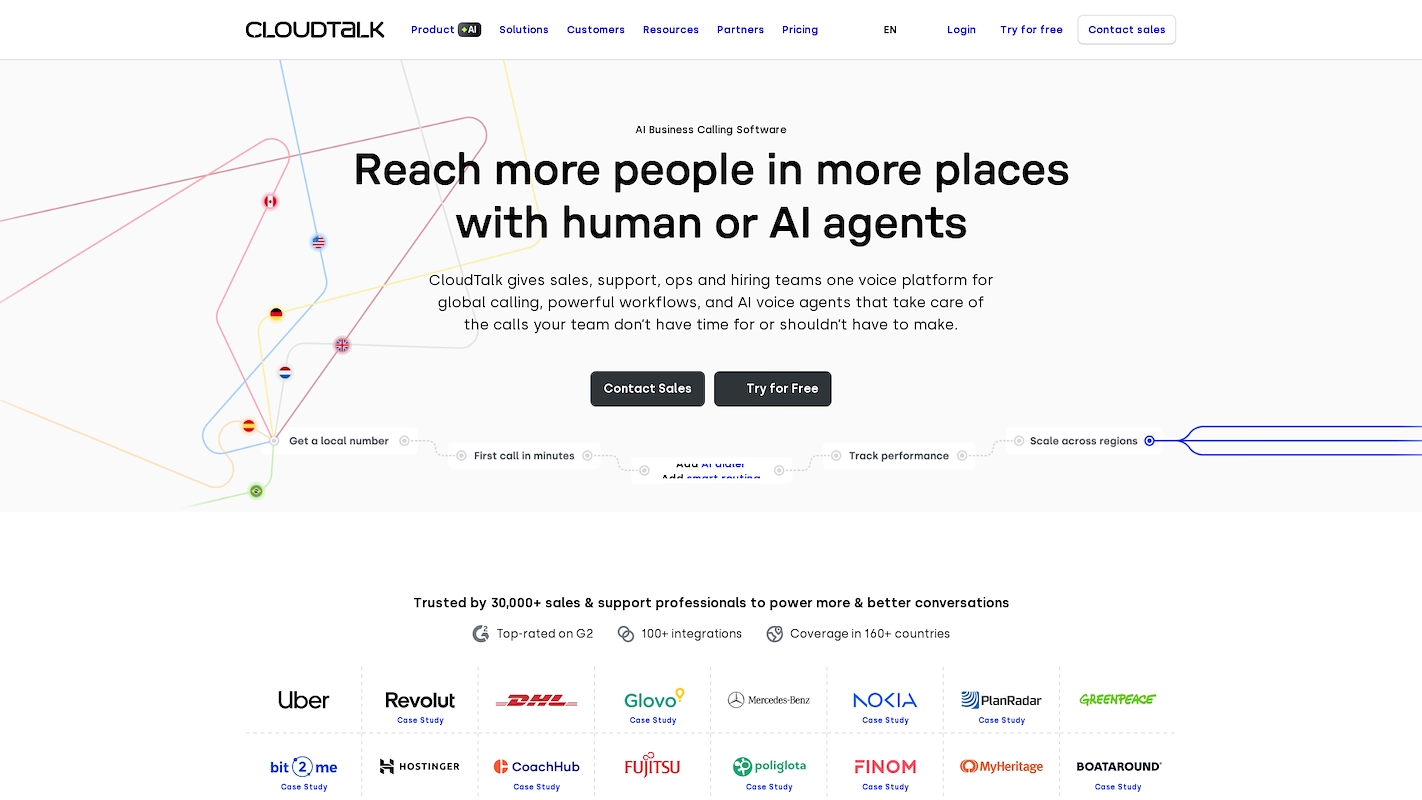
CloudTalk is a cloud phone system built for sales and customer support teams. The platform provides tools for call center operations and business calls, with a focus on outbound and inbound call management.
Companies use it to connect with business software, like CRMs or helpdesks, to keep communication data in one place.
CloudTalk's Main Features
- Deploys AI voice agents for 24/7 outbound and inbound calls.
- Provides an AI Sales Dialer with preview, power, and parallel modes.
- Uses AI Conversation Intelligence for call summaries, sentiment analysis, and topic extraction.
- Manages SMS and WhatsApp conversations with options for automated follow-ups.
How CloudTalk Compares To Ringover
Average Review Score: 4.4/5 stars based on 1,384 G2 reviews.
- CloudTalk uses AI voice agents for 24/7 call handling. This automates a process that is manual in Ringover.
- Its AI Sales Dialer includes preview, power, and parallel modes. These are more advanced dialing options for sales teams than what Ringover offers.
- The tool provides AI-driven call summaries and sentiment analysis. This offers deeper conversational insights compared to Ringover's standard call reporting.
- CloudTalk manages SMS and WhatsApp conversations with automated follow-ups. This expands communication beyond Ringover's main focus on voice calls.
Where CloudTalk May Fall Short
Some users report occasional call quality issues. This is a point of comparison with Ringover, which is known for its reliable core calling functions.
The platform's advanced features, like its AI Sales Dialer, can introduce a learning curve. In comparison, Ringover offers a more straightforward design focused on basic calling.
This tool's call flow management can feel complex because of its many automation options. This is different from Ringover's simpler approach, which some teams might find easier to handle.
Budget and Pricing Considerations
CloudTalk's pricing starts at $19 per user per month for its Lite plan, with an Essential plan at $29, when billed annually. This tiered pricing provides a clear cost structure to compare against Ringover's packages, and you can find full details on CloudTalk's official website.
7) GoTo Connect
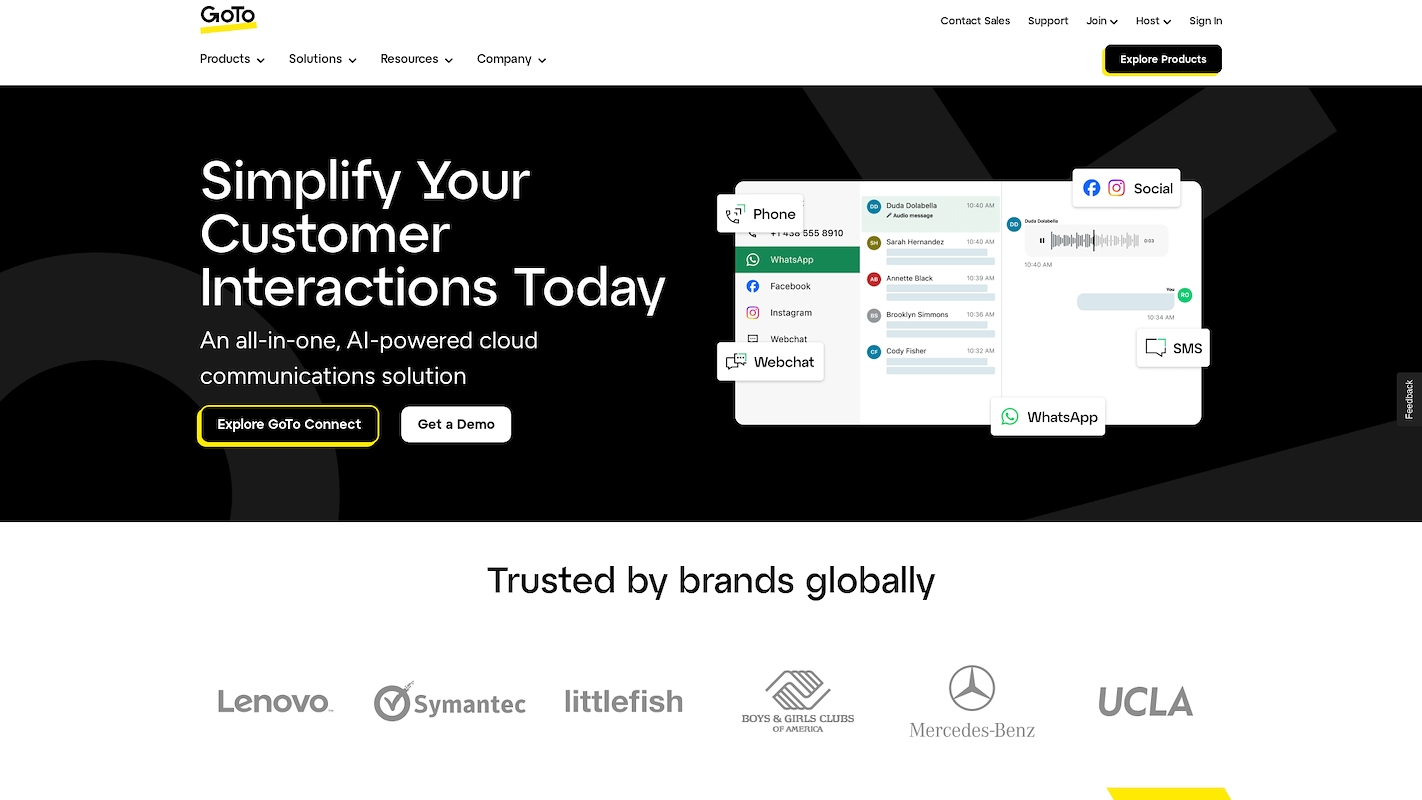
GoTo Connect is a communication platform for businesses. It combines a cloud phone system, video meetings, and team chat into one application. The service also includes contact center features to support customer interactions.
Companies use it to modernize their phone setup and support flexible work models.
GoTo Connect's Main Features
- Includes a cloud phone system with over 100 VoIP features and a visual dial-plan editor for drag-and-drop call flow creation.
- Provides an omnichannel suite that unifies digital channels like SMS, web-chat, email, and social media into the customer experience.
- Deploys an AI Receptionist to answer calls and automate tasks 24/7, along with AI-driven call summaries and sentiment analysis.
- Offers an AI-powered contact center with voice, email, chat, and WhatsApp integrations, plus quality-management tools for supervisors.
How GoTo Connect Compares To Ringover
Average Review Score: 4.4/5 stars based on 1,339 G2 reviews.
- GoTo Connect provides a visual dial-plan editor. This tool lets you build call flows with a drag-and-drop interface, a different approach from Ringover's call routing setup.
- It uses an AI Receptionist to answer and route calls 24/7. This automates a task that is handled manually within Ringover.
- The platform unifies SMS, web-chat, and social media with voice calls. This creates a broader communication hub compared to Ringover's focus on phone service.
- This service comes with a 99.999% uptime guarantee. This is a specific reliability promise, whereas Ringover is generally known for stable calling without a stated guarantee.
Where GoTo Connect May Fall Short
GoTo Connect's extensive features can create a learning curve for new users. This is different from Ringover, which offers a more straightforward design focused on core calling.
Some users report occasional call quality issues. This is a point of comparison with Ringover, which is known for its reliable core calling functions.
The platform's customer support experience can sometimes be inconsistent. This may differ from the support for a more focused tool like Ringover, which can be more direct for specific calling issues.
Budget and Pricing Considerations
GoTo Connect's Basic plan starts at $27 per user per month, and its Standard plan is $32. This pricing offers a clear cost structure to weigh against Ringover's packages. For the most accurate figures, visit GoTo Connect's official website.
8) Vonage Business Communications
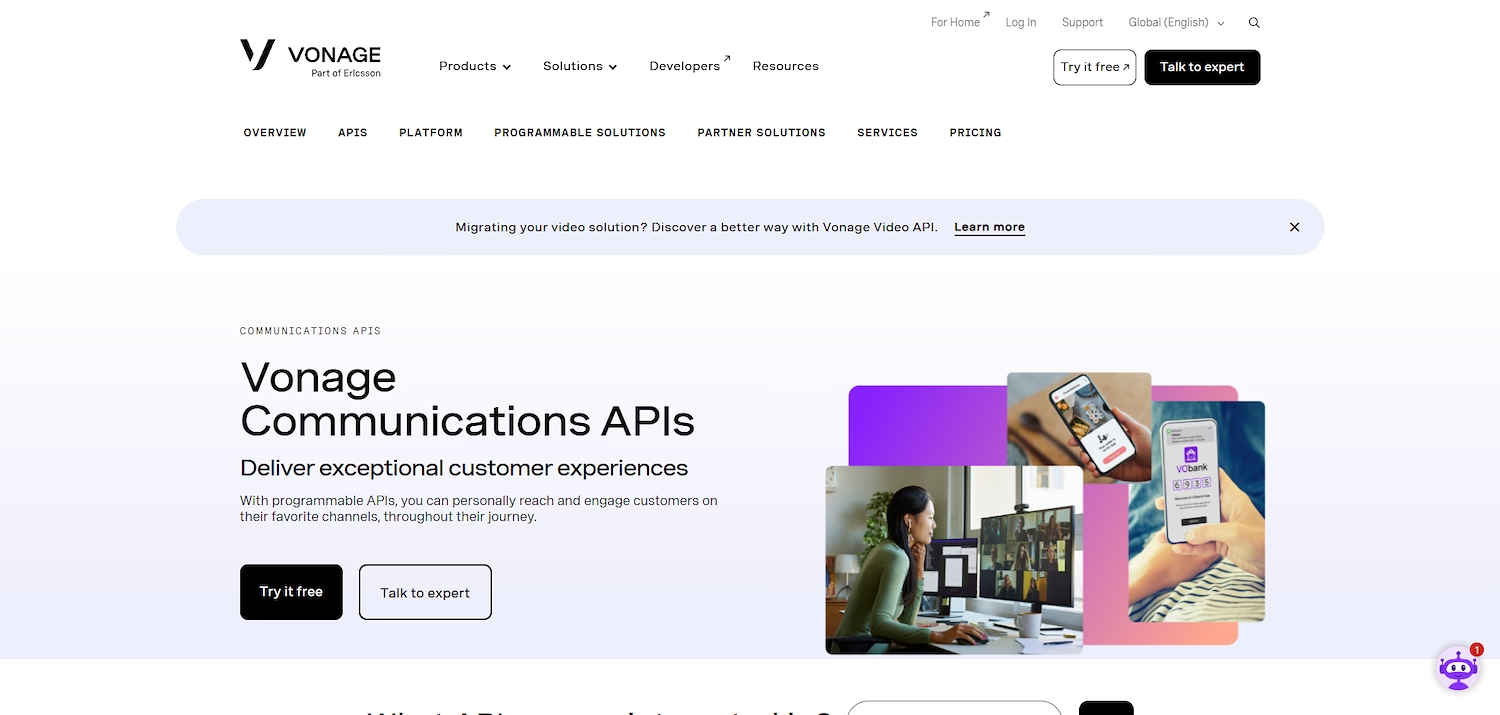
Vonage Business Communications is a cloud platform that combines phone, messaging, and video services. It provides a business phone system and contact center solution for companies.
Teams use the platform to manage calls, support remote work, and unify customer communications from a single application.
Vonage Business Communications's Main Features
- Combines voice, messaging, and video communications on a single platform.
- Includes call management features like automated attendants and hold music.
- Sends voicemails directly to email for review and management.
- Provides access through a browser extension and a downloadable application.
How Vonage Business Communications Compares To Ringover
Average Review Score: 4.3/5 stars based on 484 G2 reviews.
- Vonage Business Communications combines voice, video, and messaging in one platform. This is different from Ringover, which focuses mainly on phone calls.
- It offers a 99.999% uptime reliability guarantee. This provides a specific service level assurance that is not explicitly stated for Ringover.
- The platform operates without annual contracts, which allows users to cancel anytime. This offers more flexibility compared to the commitment that may be required with Ringover's plans.
- This tool sends voicemails directly to your email inbox for easier management. This is a convenience feature that differs from Ringover's standard voicemail system.
Where Vonage Business Communications May Fall Short
Some users report occasional call quality issues or latency. This is a point of comparison with Ringover, which is generally known for its reliable core calling functions.
Its setup can take time, with an implementation of around two months. This is different from Ringover, which often provides a faster start due to its more focused design.
The tool is perceived as a higher-cost option. This may be a factor for teams that need a straightforward dialer, a category where Ringover often presents a more budget-friendly choice.
Budget and Pricing Considerations
Vonage Business Communications does not list public pricing, but its perceived high cost suggests a model aimed at larger companies. For exact figures, it is best to visit the Vonage Business Communications's official website.
9) Five9
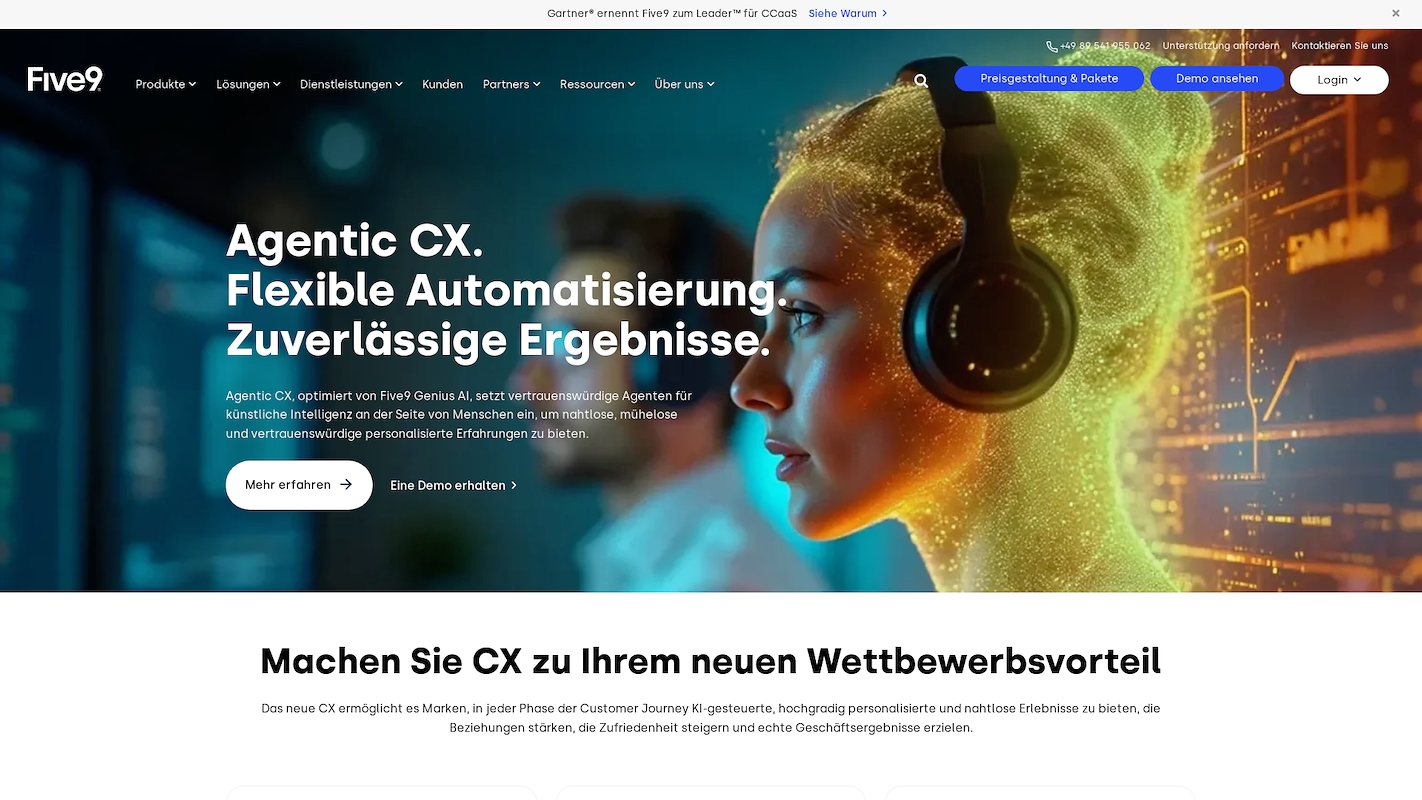
Five9 is a cloud platform for contact center operations that supports both inbound and outbound engagement. Its suite of applications includes tools for omnichannel routing, analytics, and workforce optimization. Businesses use the system for customer service and to run outbound sales campaigns from a single environment.
Five9's Main Features
- Engages customers across voice, social media, and email channels.
- Manages inbound contact flow with session routing and session queuing.
- Supports concurrent calling to handle multiple interactions at once.
- Provides session summary notes for administrative review and record-keeping.
How Five9 Compares To Ringover
Average Review Score: 4.1/5 stars based on 533 G2 reviews.
- Five9 engages customers across voice, social media, and email. This provides more communication channels than Ringover's focus on phone calls.
- It supports concurrent calls, which lets agents manage multiple interactions at once. This is a different approach from Ringover's single-call model.
- The platform offers session routing and session queuing to manage the flow of inbound contacts. This provides more advanced control over customer interactions than Ringover's standard call routing.
- This tool provides session summary notes for administrative review. This feature offers a different way to track interactions than the standard call logs in Ringover.
Where Five9 May Fall Short
Some users report that the platform's setup can be complex and requires deep knowledge of the system. This is different from Ringover, which offers a more straightforward design that teams can adopt faster.
Its user interface can feel dated and unintuitive for new administrators, according to some reviews. In comparison, Ringover provides a more modern and simple user experience for daily tasks.
The platform sometimes has call quality issues. This is a point of comparison with Ringover, which is generally known for its reliable core calling functions.
Budget and Pricing Considerations
Five9 does not list public pricing, but its perceived high cost suggests a model aimed at larger companies. For exact figures, it is best to visit Five9's official website.
10) Talkdesk
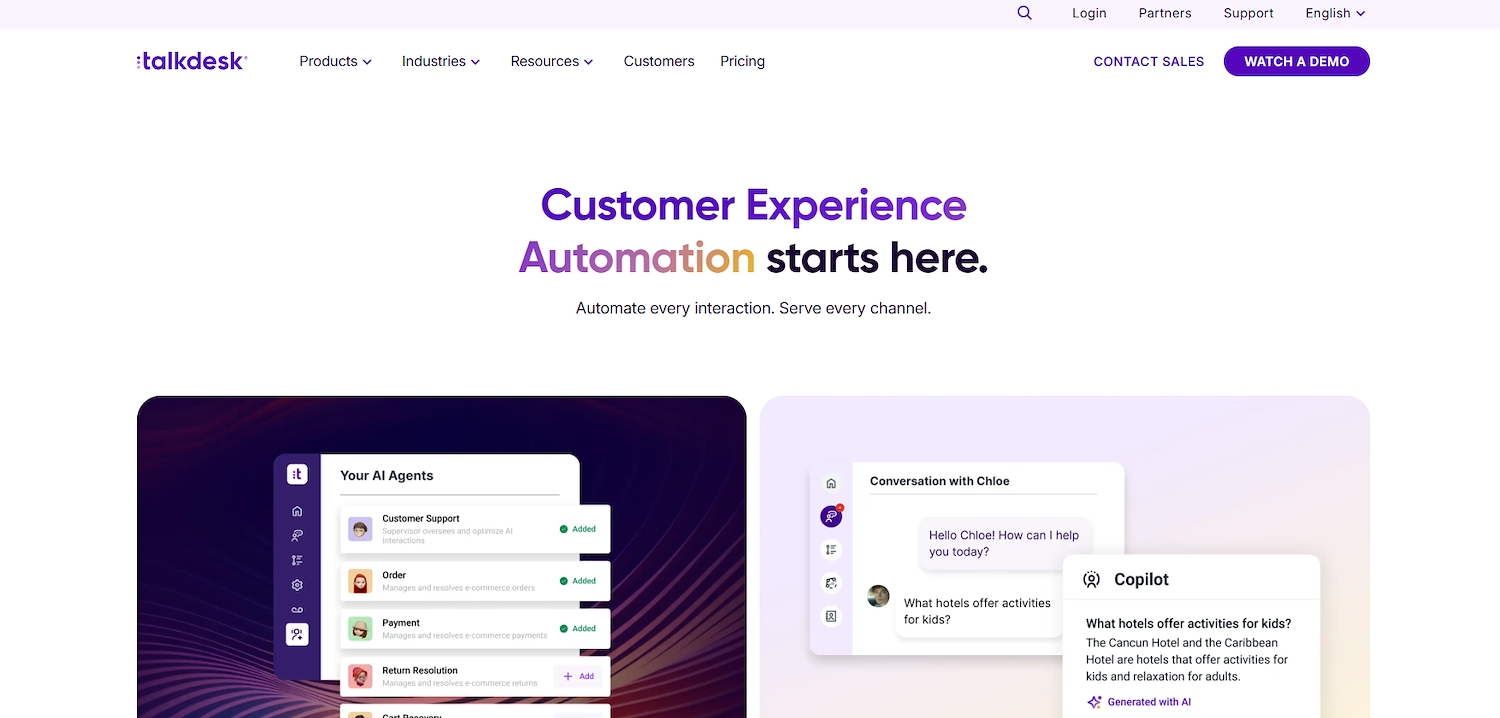
Talkdesk is a cloud contact center platform for customer experience. The system provides applications for service and sales teams. It uses AI to automate workflows and offers tools to manage customer interactions. Companies use the platform to support contact center operations from a single environment.
Talkdesk's Main Features
- Routes customer interactions across voice and email channels.
- Manages inbound contact flow with session routing and session queuing.
- Supports concurrent calling to handle multiple interactions at once.
- Provides session summary notes for administrative review and record-keeping.
How Talkdesk Compares To Ringover
Average Review Score: 4.4/5 stars based on 2,431 G2 reviews.
- Talkdesk provides session routing and queuing to manage inbound contact flow. This offers more advanced control over customer interactions than Ringover's standard call routing.
- It supports concurrent calling, which allows agents to handle multiple interactions at once. This is a different approach from Ringover's single-call model.
- The tool routes customer interactions across both voice and email channels. This creates a more unified communication space compared to Ringover's primary focus on phone calls.
- This platform provides session summary notes for administrative review. This feature offers a different way to track interactions than the standard call logs in Ringover.
Where Talkdesk May Fall Short
Some users find the platform's advanced functions complex to manage. This is different from Ringover, which offers a more straightforward design that teams can adopt quickly.
The tool can have occasional glitches that affect call quality. This is a point of comparison with Ringover, which is known for its reliable core calling functions.
Talkdesk's pricing starts at $85 per user per month. This positions it as a higher-cost option, which may be a factor for teams looking for a simple phone dialer like Ringover.
Cost-Effectiveness and Budget Impact
Talkdesk's pricing starts at $85 per user per month, positioning it as a premium option for contact center operations. This contrasts with Ringover, which generally offers a more budget-friendly model for teams that need a simple phone dialer. You can see all five Talkdesk pricing levels for a full breakdown.
Which One Should You Go With?
Choosing a Ringover alternative depends on your team's specific needs, budget, and existing software. This guide reviewed several options to help you compare features and find the right fit for your operations.
If you want to automate parts of your sales workflow, 11x offers a different approach. Its AI agents manage tasks like prospecting and outreach, which allows your sales team to focus on closing deals instead of manual GTM work.




